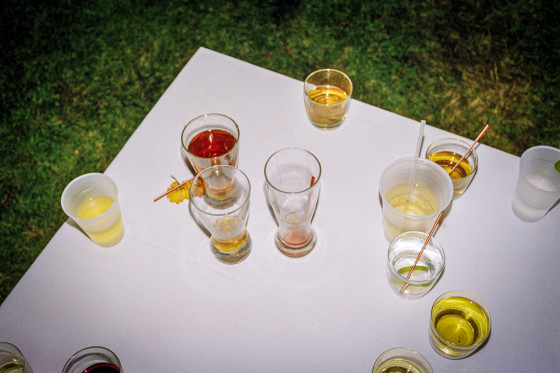
The blockbuster drugs Ozempic and Wegovy may help people
cut back on drinking
, new research published Wednesday in
JAMA Psychiatry
suggests.
In a study of around 228,000 people in Sweden who had alcohol use disorder, researchers found that people who were taking a GLP-1 drug like semaglutide were less likely to be hospitalized for alcohol-related issues.
Just over 28 million adults in the U.S. have alcohol addiction, according to the
National Institute on Alcohol Abuse and Alcoholism
.
Only three medicines, however, are approved to treat it.
“The pharmacological treatments available for AUD are not very good, and relapse is really common,” said Alex DiFeliceantonio, an assistant professor at Virginia Tech’s Fralin Biomedical Research Institute.
The study leader, Dr. Markku Lähteenvuo, a psychiatric researcher at Niuvanniemi Hospital in Finland, said: “I see so many patients who do not have good outcomes on the medications we have and who are desperate for
help with their addiction
. We really do need more tools in the toolbox.”
GLP-1 drugs — the class of medication that includes semaglutide and other popular drugs like tirzepatide — have shown potential for treating addiction.
A
clinical trial
published in 2022 found that an older GLP-1 drug called exenatide reduced drinking, but only among those who had both alcohol use disorder and obesity.
Several
other
studies
have examined drinking habits among people taking GLP-1 drugs who do not have alcohol use disorder.
In the new study, Lähteenvuo and his team looked at medical records from 228,000 people in Swedish who were diagnosed with
alcohol use disorder
from 2006 to 2023. All of the people in the study also had obesity or Type 2 diabetes.
About 60% of the participants were hospitalized for alcohol use disorder at some point during the study period.
Around 75,000 people in the study used some type of medication to treat alcohol use disorder. Among that group, the team documented about 30,000 hospitalizations. (The researchers counted total hospitalizations, which means each tally does not necessarily represent an individual person. Some people may have been hospitalized multiple times.)
The alcohol-related hospitalizations were much lower among people who took a GLP-1 drug.
For the roughly 4,300 people in the study who used semaglutide — the ingredient in Ozempic and Wegovy — there were about 220 hospitalizations for alcohol use disorder. Others in the study were taking older GLP-1 drugs, including liraglutide and dulaglutide, and also had fewer hospitalizations.
Using hospitalization to determine the drugs’ effects on alcohol use disorder is an imperfect measure, but experts said it is a good place to start.
“Alcohol withdrawal or poisoning would be why someone would require hospitalization, which is a pretty extreme outcome,” DiFeliceantonio said.
But hospital data is widely available, and it can help researchers determine which drugs may work for different types of addiction and which clinical trials they should run first, she added.
Mounting research shows GLP-1 agonists warrant a closer look, especially for alcohol addiction.
“We’ve known for some time from animal studies that GLP-1 receptor agonists reduce alcohol intake and motivation to consume alcohol,” said Christian Hendershot, director of clinical research at the University of Southern California Institute for Addiction Science.
The fact that the new study included only people who have alcohol use disorder gives better information about how effective the drugs may be for people with substance addiction, he added.
How a
diabetes drug might treat addiction
is still a mystery.
One theory is that its effects may have something to do with the drugs’ ability to induce the feeling of satiation. That may reduce cravings for drugs and alcohol the same way the
drugs work on food cravings
, Hendershot said.
“They may also reduce the rewarding effects of drugs,” he said.
There are other theories, too. Lähteenvuo said it may have something to do with the sugar in alcohol. GLP-1 drugs, he said, make sugary beverages less appealing.
Newer GLP-1 drugs, such as semaglutide and tirzepatide, enter the brain in different ways from
older versions that have been studied
, and moving forward, it will be important to test both, DiFeliceantonio said.
Hendershot said that although the drugs are very safe for people with obesity and Type 2 diabetes, they could present big safety risks for people without obesity or Type 2 diabetes, particularly because of the weight loss they induce.
Early research has also explored GLP-1 drugs for nicotine and opioid addiction, with mixed results. So far, the clearest results have come from studies on alcohol addiction — but there is still a lot to understand.
“Right now we only have three FDA-approved medications to treat alcohol use disorder. This pales in comparison to medications approved to treat other diseases,” Hendershot said. “Anything we can do to study other medications, including GLP-1 agonists, is critically important for our field.”
Note: Thank you for visiting our website! We strive to keep you informed with the latest updates based on expected timelines, although please note that we are not affiliated with any official bodies. Our team is committed to ensuring accuracy and transparency in our reporting, verifying all information before publication. We aim to bring you reliable news, and if you have any questions or concerns about our content, feel free to reach out to us via email. We appreciate your trust and support!
